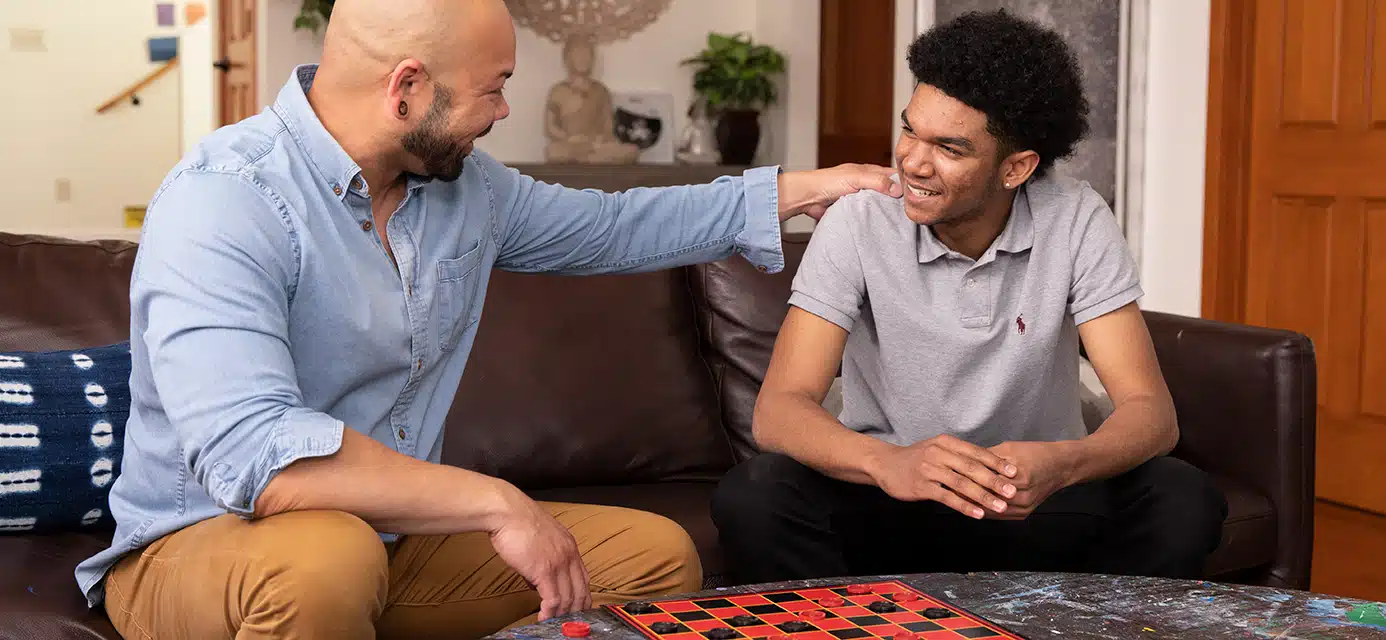The new reality show “The Parent Test” explores a question that every parent has considered: What type of parenting works best? Instead of using research to answer that question, however, the show has its 12 families with different parenting styles take challenges—like petting a snake or having the kids make dinner by themselves. How the parents and kids approach the challenges illustrates how well each parenting style works in real-life situations. Then each style is judged by the other parents.
The “Parent Test” show features a wide variety of parenting styles, including child-led, traditional, disciplined, strict, high-achieving, free range, New Age, and helicopter parenting. However, the field of psychology generally recognizes just four types of parenting styles. These four parenting styles are based on the work of developmental psychologist Diana Baumrind and Stanford University researchers Eleanor Maccoby and John Martin.
Key Takeaways
- There are 4 types of parenting styles: authoritative, authoritarian, permissive, and neglectful.
- Research show that the different parenting styles impact children’s well-being and behavior in different ways.
- Parenting style is one of various factors that determine a child’s risk of developing mental health issues.
- Experts say authoritative parenting is the best parenting style for raising self-reliant and confident kids.
What Are the 4 Types of Parenting Styles?
Developed in the 1960s, Baumrind’s parenting styles theory came out of her observation of preschool children and their parents. She saw how different types of parenting led to different ways of behaving and reacting in their children. Consequently, she was able to connect certain styles of parenting with particular outcomes in child development and behavior.
The original Baumrind parenting styles were authoritative parenting, authoritarian parenting, and permissive parenting. Maccoby and Martin expanded Baumrind’s model to include the neglectful parenting style. Hence, the four types of parenting styles are:
- Authoritative parenting (democratic)
- Authoritarian parenting (disciplinarian)
- Permissive parenting (indulgent)
- Neglectful parenting (uninvolved)
The four parenting styles exist on a spectrum that includes different levels of demandingness and responsiveness. Demandingness refers to how much parents control their child’s behavior and require them to be mature. Responsiveness refers to how accepting parents are of their child’s behavior and how sensitive they are to their child’s emotional and developmental needs. A typical parenting styles chart maps where each of the four different parenting styles falls as far as demandingness vs. responsiveness.

High levels of both responsiveness and demandingness
Warm and accepting while also setting clear expectations

High in demandingness, uses punishment to enforce rules
Lower responsiveness, less warm and accepting

Highly responsive, warm, and accepting
Fails to set clear expectations and boundaries

Low levels of both demandingness and responsiveness
Does not set expectations; emotionally removed
2023 Trends in Parenting Styles
A 2023 Pew Research survey, “Parenting in America Today,” collected data from 3,757 US parents with children under age 18. The survey asked about their types of parenting styles. Overall, most parents did not believe they adhered to a specific parenting style. That confirms the general truth that most parents fluctuate between different parenting styles rather than adhering entirely to one style. For example, many of the parenting styles featured on “The Parent Test” contain elements of several of the Baumrind parenting styles.
In another Pew Research survey, parents were asked whether they wanted to raise their kids the same way they were raised. A little under half of parents said they did want to raise their children the same way they were raised, particularly in terms of the values and beliefs they grew up with. And about the same percentage said they wanted to raise their children differently than they were raised. For this group, focusing more on unconditional love and a stronger sense of connection with their kids was most important.
What Today’s Parents Say About Their Parenting Styles
Here are some of the Pew Research Center’s findings regarding types of parenting styles among today’s parents:
- Most parents (45 percent) say they tend to be overprotective, 20 percent say they tend to give too much freedom, and 34 percent say neither
- 1 in 3 parents says they give in too quickly, and about the same number say they tend to stick to their guns too much
- One-quarter of parents believe they praise their children too much
- 20 percent say they criticize their children too much
- 30 percent say they don’t push their children hard enough, while 25 percent say they push their kids too hard
As “The Parent Test” show illustrates, many people who grow up feeling neglected, overcontrolled, or not accepted by their parents are determined to create a very different experience for their own kids. While some of the families on the show set out to recreate their own upbringing, others want to ensure their children never feel the way they did as kids.
Deconstructing the 4 Parenting Styles
Let’s take a closer look at the four types of parenting styles, examples of each, and how they impact children’s behavior and well-being.
Authoritative Parenting Style
In the authoritative parenting style, parents set clear guidelines and expectations. Rather than punishing, they tend to allow natural consequences to unfold and help children learn from these situations. They often use what’s known as inductive disciplining—guiding kids to think about how their behavior affects others rather than controlling them through punishment or threats.
In addition, authoritative parents establish strong emotional connections with their children and are attuned to their kids’ needs, feelings, and opinions. They provide safety, acceptance, warmth, and open communication. These parents freely offer their children praise and validation.
Children raised with authoritative parents tend to be:
- High in self-esteem
- Confident
- Trusting of the world and others
- Able to build strong friendship and romantic relationships
- Self-reliant and self-disciplined
Authoritarian Parenting Style
Authoritarian parents set strict rules for their children and can be rigid in their expectations. If the child disappoints them, an authoritarian parent may respond with criticism, anger, and/or punishment. This type of parenting style often takes the “tough love” approach.
In the authoritarian parenting style, parents set the rules without regard to what the child thinks. When asked why they need to follow the rule, an authoritarian parent may say, “I told you so.” They believe that parents know best, and are not necessarily interested in explaining their reasoning or taking the child’s opinion or feelings into consideration.
Children with authoritarian parents tend to:
- Fear questioning authority
- Have poor boundaries
- Be high achievers
- Struggle to get in touch with their own needs
- Have low self-esteem

Permissive Parenting Style
Sometimes called child-led or free range, the permissive parenting style is extremely lenient and often lacks clear guidelines and expectations. Permissive parents are sometimes reacting to their own authoritarian parenting by going in the opposite direction. These indulgent parents let kids make their own decisions rather than setting limits or telling them what to do. And they bend over backwards to do what their kids want, keep them happy, and avoid conflict. They want to be friends with their kids.
Some children do well with permissive parenting, especially those who are naturally independent. But for children who crave more structure and security, permissive parenting can lead to anxiety and a sense of insecurity.
Children with permissive parents tend to:
- Have poor self-regulation
- Struggle with relationships
- Be more impulsive and aggressive
Uninvolved Parenting Style
Uninvolved parents are preoccupied with their own needs, which prevents them from tuning into their child’s needs. The kids are left to fend for themselves, without much guidance or nurturing. Neglectful parents rarely set or enforce rules, creating a lack of structure and safety.
Neglectful parents may seem cold and uncaring. However, these parents may be overwhelmed by their own issues, such as mental health or physical health problems. Children of uninvolved parents may end up taking on adult roles and tasks before they are ready to.
Children with uninvolved parents tend to:
- Find interpersonal connection difficult
- Struggle with behavioral issues and emotional self-regulation
- Have low self-esteem
- Have a higher risk of depression
What Makes a Parenting Style Successful?
What effect do parents hope their parenting styles will have on their children? Parents set different values on different traits. For example, the dad with a high-achieving parenting style in “The Parent Test” television show wants his son to excel in whatever he does. In contrast, the free range and child-led types of parenting focus on letting kids follow their own lead and discover what they enjoy most.
In the Pew Research survey, parents rated these five qualities, in order, as the most important ones for their kids to have as adults:
- Honest and ethical
- Hardworking
- Accepting of people who are different from them
- Help others in need
- Be ambitious
But what is the ultimate goal of parenting? “The Parent Test” host Adolph Brown III, known as Doc Brown, describes a successful parenting style as one that supports kids to be healthy, happy, and kind, with the skills to navigate the larger world. Experts agree that a parenting style is successful when it nurtures resilience, the ability to form authentic connections, and compassion for others and oneself.

Which Parenting Style Is the Best?
We’ll have to wait until the “The Parent Test” season is over to find out what Doc Brown and the 12 families decide. However, parenting and mental health experts generally agree that the authoritative parenting style strikes the most effective balance between demandingness and responsiveness. Research on the impact of authoritative parenting vs. authoritarian parenting, uninvolved parenting, and permissive parenting finds that children of authoritative parents have better mental health and higher self-esteem. They are generally more independent, self-reliant, and comfortable socially. According to the American Academy of Pediatrics, authoritative parenting is “strongly associated with positive mental health and behavioral outcomes in children and adolescents.”
Moreover, research suggests that authoritative parenting can prevent teens from experimenting with drugs and alcohol. That includes not only the kids themselves, but also their friends. A study published in the Archives of Pediatric and Adolescent Medicine analyzed the data from multiple years of the ongoing National Longitudinal Study of Adolescent Health. They found the following results for teens with friends who had strict parents versus those with permissive parents:
- 40 percent less likely to drink
- 39 percent reduction in smoking
- 38 percent less apt to engage in binge-drinking
- 43 percent decrease in marijuana use.
No Parenting Style Is Perfect
It’s important to recognize that even children with loving and positive parents who practice authoritative parenting style may struggle sometimes. And they may experience depression, anxiety, or other mental health issues. Parenting is just one of the factors that impact mental health; genetics, brain function, and individual child temperament and neurobiology each play a part. Moreover, parents are only human. Even the most caring and attentive parents can’t read their child’s mind and meet their needs 100 percent of the time.
One thing that parents share, regardless of their parenting style, is the desire to keep their kids safe and well, physical and mentally. The Pew Research survey found that 40 percent of parents are extremely or very worried about their child developing anxiety or depression. And another 36 percent say they are “somewhat” worried about this. In addition, 1 in 3 parents surveyed was concerned about their child being bullied.
How Teen Treatment Strengthens the Parent-Child Relationship
At Newport Academy, we see parents as the solution, not the problem. We know that as the parent-child connection grows stronger, teen mental health improves. Attachment-Based Family Therapy, the foundational modality for our approach to adolescent treatment, is designed to repair ruptures in the parent-child relationship and restore trust. As a result, teens feel safe turning to their parents for support when they are struggling.
Newport’s outcomes research shows that our family-focused approach provides a clear path to achieving what both parents and children want most: closer, more meaningful relationships with one another, which in turn lead to improvements in mental health and reductions in suicide risk. This secure foundation of support is critical to young people’s well-being. It provides a buffer against distress, enhances resilience, and creates a safe haven in challenging times.
Contact us today to learn more about our clinical model, our family therapy component, and our industry-leading treatment outcomes.
Frequently Asked Questions
What are the 4 different types of parenting styles?
Which of the 4 parenting styles is the best?
What is the most harmful parenting style?
What is the most common parenting style?
Sources
J Psychol Behavior Stud. 2021 Dec; 10.32996.
Front. Psychol. 2021 Oct; 12: 10.3389.






